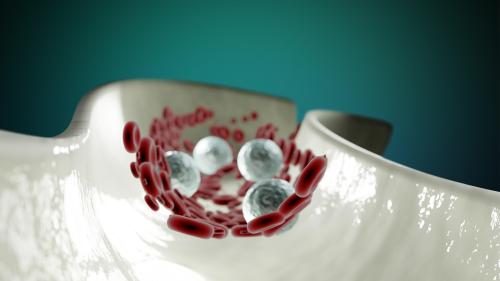
Blocked leg arteries – often caused by diabetes or smoking – are very common, but if left untreated can lead to amputation, or even death. To improve blood flow, a procedure called an angioplasty is usually carried out, with patients given blood-thinning drugs afterwards. A new trial led by North Bristol NHS Trust, in collaboration with the Centre for Trials Research at Cardiff University and the University of Bristol, will compare three commonly prescribed blood-thinning tablets to find out which works best.
Funded by £2.5 million from the National Institute for Health and Care Research (NIHR), CLARITY PAD (CLopidogrel, Aspirin and RIvaroxaban after revascularisation with angioplasTY for limb threatening Peripherial Arterial Disease) will evaluate three different combinations of blood-thinning tablets — clopidogrel; aspirin and clopidogrel, and aspirin and rivaroxaban.
More than 4,000 angioplasties to increase blood flow in the leg are performed each year in the UK. Patients are given blood-thinning tablets after the procedure to reduce the risk of artery-blocking again, amputation, and blockages of other arteries in the body, to try to prevent heart attack, stroke or death.
There are many types of blood-thinning tablets, but currently it is not known which one or combination is the best. Occasionally, two types are used together. If two blood thinners work better than one, up to 1,600 lives could be saved and 800 amputations prevented each year in the UK by using them routinely.
The randomised trial will recruit 1,239 participants from 20 to 30 hospitals around the UK. Participants will be chosen to take one of the combinations of blood-thinning tablets, which they will take for up to three years.
The participants will be followed up by the research team to find out if a certain tablet or combination of tablets is better at saving legs and lives after angioplasty.
Mr Chris Twine, Consultant Vascular Surgeon at North Bristol NHS Trust, Honorary Associate Professor of Vascular Surgery at Bristol Medical School at the University of Bristol, and Chief Investigator, said: “The CLARITY PAD trial addresses crucial research priorities for people living with the most serious form of peripheral arterial disease (PAD).
“Our trial is the largest trial of this type for chronic limb threatening ischaemia in the UK. We hope it will help thousands of people living with this condition now and in the future.”
Dr Philip Pallmann, Principal Research Fellow in Statistics at the Centre for Trials Research at Cardiff University and lead trial statistician, explained: “Blocked leg arteries can lead to serious health issues, including amputation. Our trial will investigate which blood-thinning treatments after angioplasty is most clinically- and cost-effective in preventing complications post-angioplasty while providing the best medical treatments in patients with PAD. We hope our findings will provide clear guidance for clinicians and improve patient safety and quality of care.”
Dr Dave Gillespie, Director of Infection, Inflammation and Immunity Trials at the Centre for Trials Research at Cardiff University, added: “We are delighted to be working with Chris Twine on this important clinical trial. It builds on our portfolio of vascular and surgical research in the Centre.”
The research trial opened for recruitment on 14 January 2025. For more information or to register your interest, please email the study team: CLARITY-Trial@cardiff.ac.uk or visit www.claritypadtrial.co.uk.
Watch an animated video explaining the CLARITY PAD trial.
Randomised trial examining clinical and cost effectiveness of three antithrombotic regimens following endovascular lower limb revascularisation for chronic limb threatening ischaemia: CLARITY PAD (CLopidogrel, Aspirin and RIvaroxaban after revascularisation with angioplasTY for limb threatening Peripherial Arterial Disease) is a 5-year trial and will run until December 2028.
